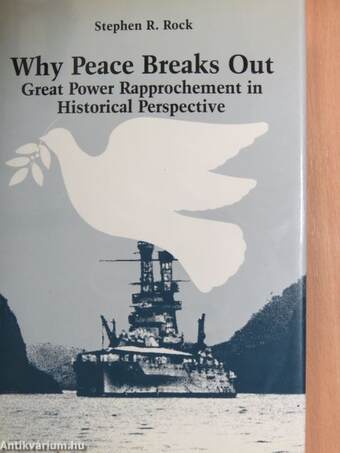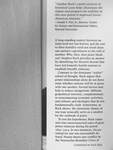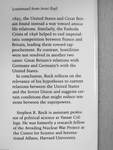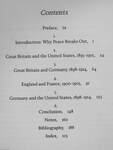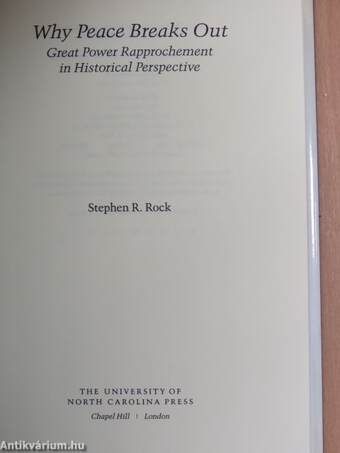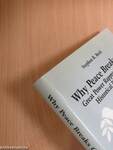1.069.263
kiadvánnyal nyújtjuk Magyarország legnagyobb antikvár könyv-kínálatát

VISSZA
A TETEJÉRE
JAVASLATOKÉszre-
vételek
Why Peace Breaks Out
Great Power Rapprochement in Historical Perspective
| Kiadó: | The University of North Carolina Press |
|---|---|
| Kiadás helye: | Chapel Hill |
| Kiadás éve: | |
| Kötés típusa: | Vászon |
| Oldalszám: | 220 oldal |
| Sorozatcím: | |
| Kötetszám: | |
| Nyelv: | Angol |
| Méret: | 24 cm x 16 cm |
| ISBN: | 0-8078-1857-7 |
naponta értesítjük a beérkező friss
kiadványokról
naponta értesítjük a beérkező friss
kiadványokról
Fülszöveg
"Stephen Rock's careful analysis of historical cases helps illuminate the origins and prospects for stability in this newperiod of improved Soviet-American relations." —Joseph S. Nye, Jr., director, Center for Science and International Affairs, Harvard University
¦yy-Hi.
A long-standing enmity between na-tions need not last forever, and the end to their hostility need not result from one nation's capitulation to the will of another. Why, then, does peace break out? Stephen Rock provides an answer by identifying the decisive factors that have led formerly hostile nations to establish friendly relations.
Contrary to the dominant "reálist" school of thought, Rock argues that power relationships alone do not deter-mine whether nations will be at peace with one another. Several factors may help to reduce antagonism: different geopolitical interests, complementary or noncompeting economic activities, and cultures and ideologies that do not fundamentally clash. Sometimes, as Rock... Tovább
Fülszöveg
"Stephen Rock's careful analysis of historical cases helps illuminate the origins and prospects for stability in this newperiod of improved Soviet-American relations." —Joseph S. Nye, Jr., director, Center for Science and International Affairs, Harvard University
¦yy-Hi.
A long-standing enmity between na-tions need not last forever, and the end to their hostility need not result from one nation's capitulation to the will of another. Why, then, does peace break out? Stephen Rock provides an answer by identifying the decisive factors that have led formerly hostile nations to establish friendly relations.
Contrary to the dominant "reálist" school of thought, Rock argues that power relationships alone do not deter-mine whether nations will be at peace with one another. Several factors may help to reduce antagonism: different geopolitical interests, complementary or noncompeting economic activities, and cultures and ideologies that do not fundamentally clash. Sometimes, as Rock shows, the imminent chance of war may ironically serve as a catalyst for the outbreak of peace.
To test his hypotheses, Rock exam-ines four interconnected cases of great power relations during the period 1895-1914. In two instances, the po-tential for war was successfully de-fused. Nearly drawn into conflict by the Venezuelán Boundary Crisis of
(continued on back flap)
(continued from front flap)
1895, the United States and Great Brit-ain found instead a way toward amica-ble relations. Similarly, the Fashoda Crisis of 1898 helped to end imperial-istic competition between Francé and Britain, leading them toward rap-prochement. By contrast, hostilities were not resolved in another two cases: Great Britain's relations with Germany and Germany's with the United States.
In conclusion, Rock reflects on the relevance of his hypotheses to current relations between the United States and the Soviet Union and suggests cer-tain conditions that might reduce ten-sions between the superpowers.
Stephen R. Rock is assistant profes-sor of political science at Vassar College. He was formerly a research fellow of the Avoiding Nuclear War Project at the Center for Science and International Affairs, Harvard University. Vissza
Témakörök
- Idegennyelv > Idegennyelvű könyvek > Angol > Történelem > Európa története > Egyéb
- Idegennyelv > Idegennyelvű könyvek > Angol > Történelem > USA története
- Történelem > Idegennyelvű > Angol
- Történelem > Kontinensek szerint > Európa, európai országok története > Egyéb
- Történelem > Politika > Külpolitika > Diplomácia
- Történelem > Legújabb kor > Egyéb
- Történelem > Kontinensek szerint > Amerika, amerikai országok története > Észak-Amerika
- Történelem > Újkor > Egyéb
- Történelem > Hadtörténet > Hadügy, hadviselés



